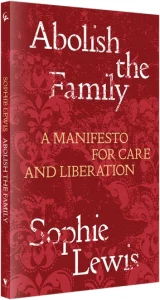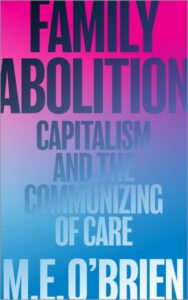One of the developments on the radical left that I have found most inspiring in recent years is the rapid  growth of sharp thinking about the social organization of caregiving. In all of this thinking, I have been most excited about family abolition—a political project that challenges the family form as a linchpin of settler-colonialism, racial capitalism, and hetero-patriarchy, and explores more liberatory possibilities for care. As we live through a large-scale crisis of care and frightening attempts by authoritarians to fortify the most repressive aspects of the family form, the project of family abolition is urgently relevant.
growth of sharp thinking about the social organization of caregiving. In all of this thinking, I have been most excited about family abolition—a political project that challenges the family form as a linchpin of settler-colonialism, racial capitalism, and hetero-patriarchy, and explores more liberatory possibilities for care. As we live through a large-scale crisis of care and frightening attempts by authoritarians to fortify the most repressive aspects of the family form, the project of family abolition is urgently relevant.
Two major contributions to this project are Sophie Lewis’ Abolish the Family: A Manifesto for Care and Liberation, published last years by Verso, and M.E. O’Brien’s Family Abolition: Capitalism and the Communizing of Care, published this year by Pluto Press. I can’t say enough good things about these two, which O’Brien appropriately describes as companion volumes. Lewis offers an accessible and provocative introduction to family abolition, and O’Brien goes deep into the history of the family and  speculates about the future of family abolition. These books are worth reading and discussing!
speculates about the future of family abolition. These books are worth reading and discussing!
Here’s one representative gem from Lewis:
I’d wager that you, too, can imagine something better than the lottery that drops a neonate arbitrarily among one or two or three or four individuals (of a particular class) and keeps her there for the best part of two decades without her consent, making her wholly beholden to them for her physical survival, legal existence, and economic identity, and forcing her to be the reason they give away their lives in work. I’d wager that you, too, can imagine something better than the norm that makes a prison for adults—especially women—out of their own commitment to the children they love. Together, we can invent accounts of human “nature,” and ways of organizing social reproduction, that are not just economic contracts with the state, or worker training programs in disguise. Together, we can establish consensus-based modes of transgenerational cohabitation, and large-scale methods for distributing and minimizing the burden of life’s work.